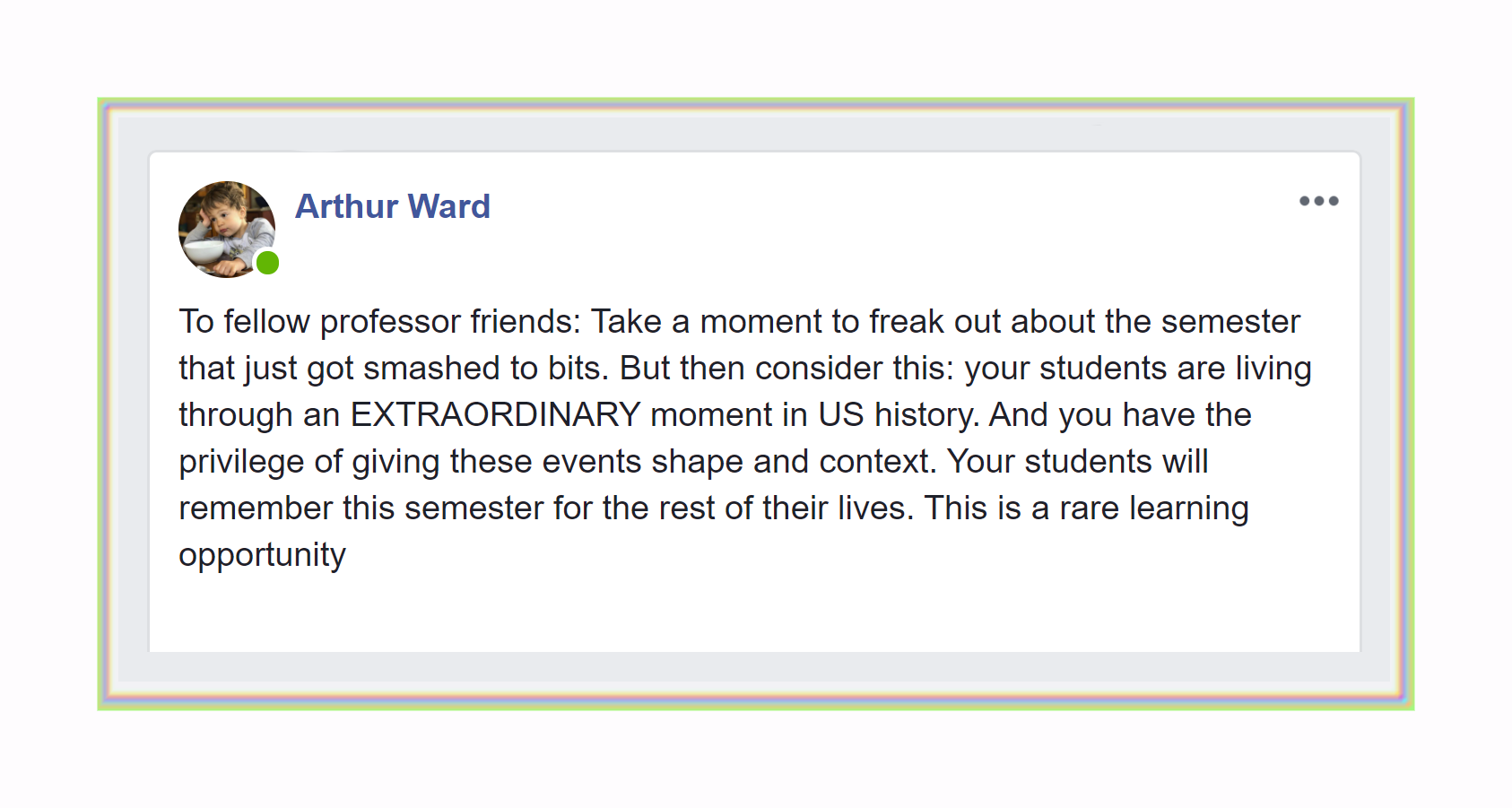A Rare Learning Opportunity
“Do you remember when they cancelled college because of the coronavirus?”
Crises are focal points for the memory. The current crisis we’re now undergoing will long be remembered by various parties for various reasons, and this is something that we might want to appreciate as teachers.
To fellow professor friends: Take a moment to freak out about the semester that just got smashed to bits. But then consider this: your students are living through an EXTRAORDINARY moment in US history. And you have the privilege of giving these events shape and context. Your students will remember this semester for the rest of their lives. This is a rare learning opportunity.
Those are the words of philosopher Arthur Ward, who works at Lyman-Briggs College at Michigan State University, in a recent update on Facebook. (Readers may recall Dr. Ward from last year’s “A Life-Saving Professor“.)
Dr. Ward is right: this is a rare learning opportunity. Should we use it to teach about something related, even if distantly, to one of the many aspects of the current crisis? Are you considering doing this? Please share your ideas for what might be good to teach to take advantage of this opportunity, and how.




This seems as good a time as any to plug for basic decision theory. Maybe best to also throw in group agency and practical reasoning in groups…
I’m teaching medical ethics next term and am now thinking of doing a unit on triage. I suspect I’m not the only one. Maybe Daily Nous could crowdsource readings on the topic? (I need all the help I can get).
Yes, I’d be interested in that, too. I’ll be teaching medical ethics for the first time in the spring, and obviously I’ll want to include some coronavirus-related stuff.
If you’re open to using podcasts as case studies for discussing triage, this is a great one: https://www.wnycstudios.org/podcasts/radiolab/articles/playing-god
The first part is about the extraordinary (and likely criminally negligent) healthcare rationing decisions made in Memorial Hospital during Hurricane Katrina. The second part covers different strategies for weighing who should receive access to a ventilator in a pandemic. It profiles town hall discussions about emergency ventilator allocation that were actually held in Maryland; it’s easy to set up a class to engage in a similar sort of discussion.
(An important caveat, though: I’ve only done this in the past when we’re not actually facing a pandemic where people are likely to die from lack of access to ventilators. Proceed with caution, and be kind to anxious students and those with personal connections to this virus, as Two Thoughts mentions below.)
You can easily pair this content with a general overview of different principles for distributive justice. I switched around my syllabus this week to move my week on triage up from the end of the semester to the week after our spring break. I’m going to pair the podcast with this Atlantic piece about how doctors in Italy are explicitly adopting a utilitarian approach to triage: https://www.theatlantic.com/ideas/archive/2020/03/who-gets-hospital-bed/607807/
I also spent the first half of my most recent bioethics classes letting students do an open Q&A/discussion about ethical or philosophical issues surrounding the coronavirus (e.g., about weighing competing values when deciding whether to quarantine and how to respond to an epidemic, duties to protect self vs. others, what the role of government should be, etc. I was very clear that I could not answer scientific questions!) They had a lot of questions and seemed very glad for the chance to talk about it together in class. I think this would be a useful thing to do in *any* philosophy class, especially an ethics course. It was definitely worth shortening the regularly scheduled content for the day in order to give students a chance to talk about this.
Thank you! This is fantastic.
I use the Radiolab episode at the beginning of a class I teach titled “Moral Issues of Life & Death” and students seem to be gripped by it. So, I second the recommendation.
I was recently wrapping up an ethics course and thought about using the paper linked below on the duty to treat in a pandemic. I didn’t end up teaching the paper (I might next quarter), but it seems like it would be a good fit for a medical ethics course. It’s the target article of an issue of the American Journal of Bioethics, and there might be some good stuff in the responses, too: https://philpapers.org/rec/MALEPA
I also generally think the literature on inductive risk in philosophy of science is relevant: How much evidence ought scientists to demand before making empirical claims or recommending a course of action? And should the amount and type of evidence scientists require shift according to the nonepistemic consequences of false positives and false negatives? Heather Douglas’s 2000 paper and her 2009 book are the loci classici, but there’s a pretty large literature on it now (Ted Richards and Kevin Elliott have a recent volume: Exploring Inductive Risk).
These resources may be helpful for discussions of triage/decision-making concerning scarce resources:
Atlantic, “The Extraordinary Decisions Facing Italian Doctors”:
https://www.theatlantic.com/ideas/archive/2020/03/who-gets-hospital-bed/607807/?utm_campaign=the-atlantic&utm_source=facebook&utm_term=2020-03-11T16%3A56%3A39&utm_content=edit-promo&utm_medium=social&fbclid=IwAR2yODFYlgiYg2Atomufcjc2GFG0Z8pSm6z77o8gCflszTFIObC2vpqn3zo
Guidelines for Medical Professionals, published by the Italian College of Anesthesia, Analgesia, Resuscitation and Intensive Care (SIAARTI): [opens as PDF]
http://www.siaarti.it/SiteAssets/News/COVID19%20-%20documenti%20SIAARTI/SIAARTI%20-%20Covid19%20-%20Raccomandazioni%20di%20etica%20clinica.pdf
Folks interested in the ethics of triage might like teaching 3 recent op-eds authored or co-authored by ethicists:
– “How the Coronavirus May Force Doctors to Decide Who Can Live and Who Dies”, https://www.nytimes.com/2020/03/12/opinion/coronavirus-hospital-shortage.html (Zeke Emanuel @ UPenn and i — happy to share if you have paywall issues)
– “Coronavirus may force UK doctors to decide who they’ll save” https://www.theguardian.com/commentisfree/2020/mar/14/coronavirus-outbreak-older-people-doctors-treatment-ethics (Jonathan Ives, Bristol)
– “U.S. hospitals may have to ration care during the pandemic. Here’s one approach.” https://www.washingtonpost.com/outlook/2020/03/12/us-hospitals-may-have-ration-care-during-pandemic-heres-one-approach/?utm_campaign=wp_opinions&utm_medium=social&utm_source=twitter (Ruth Faden @ Johns Hopkins, others)
We should also keep in mind that some experts suggest that all of us will know someone who dies because of this outbreak. So, if we’re thinking of this as a learning opportunity, we should do so in a way that is sensitive to and empathetic toward the suffering that this crisis may bring to many of our students’ families.
That said, this episode of The Daily features a researcher talking through the ethics of testing for the virus even when her lab wasn’t supposed to do so: https://www.nytimes.com/2020/03/11/podcasts/the-daily/coronavirus-us-testing.html This may be a helpful starting point for a conversation on ethics?
An excerpt: “We talked through the ethics of the different options — keep it to ourselves, tell public health, or tell the participants. And what we are allowed to do was to keep it to ourselves. But what we felt like we needed to do was to tell public health. And so that’s what we did.”
Forget school closings! A more important ethical question will come when Trump has competing requests for financial support from General Motors about to close its factories, and AARP wanting assurances for the protection of its dwindling membership.
Decameron?
I’ll be doing a week on Stoicism in all my classes. It’s of course directly relevant to my Ancient Philosophy class; but I’ll also be using it as an example of mental technology in my Phil of Technology classes. Even if I couldn’t make it directly relevan to the particular class,, I’d do it any way, because it’s relevant to the moment my students (and myself) are living through.
I’m teaching Existentialism this semester, and wasn’t planning on having the students read Camus’ The Plague. Now I am.